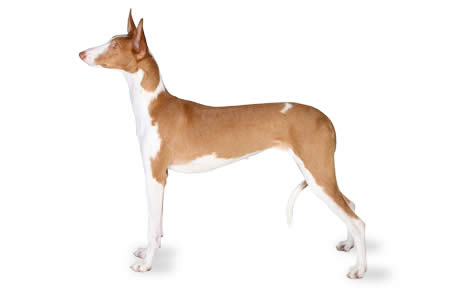Type the name of the breed you're looking for below
[wpdreams_ajaxsearchlite] Don't see the breed your're looking for? Click here and let us know!
Breed Characteristics
1 paw - breed exhibits the least amount of this characteristic
5 paws - breed exhibits most amount of this characteristic
Ibizan Hound
| Other Names | Ca Eivissenc, Podenco Ibicenco, Ibizan Warren Hound |
| Country of Origin | Spain |
| Weight | 42 - 55 lbs. (19 - 25 kg) |
| Height (at withers) | 22 - 29 in. (56 - 74 cm) |
| Coat | There are three varieties of Ibizan: smooth-haired, longhaired and wirehaired. The most common is the smooth-haired and the longhaired is very rare. The wirehaired has a longer coat of rough hair that is softer textured than the other two varieties. |
| Colour | Colours are white and red, white and tan, or solid white or red. |
| Litter Size | 4 - 8 puppies, average 6 |
| Life Span | 10 - 14 years |
| Origin & History | The Ibizan Hound has been depicted in many Ancient Egyptian art forms, and dogs painted on hieroglyphs and sculptures from over 5,000 years ago closely resemble the hound. The dog is thought to have been brought to the Western world from Egyptian and Spanish traders around 700-900 BC. It is a common dog found on the island of Ibiza and nearby islands often reduced their rabbit and small game counts because of Ibiza Hound hunts. Since the Ibiza Hound enjoys many types of hunts and terrain-exploration, it has become a very fast breed. Working primarily by sight and smell, it can also be used for nocturnal hunting and is a valuable asset to many game hunters. Many Spanish hunters have become famous for running and raising these dogs in packs so that they can make the most of their instinctual skills. This breed is excellent in the sport of lure coursing, and can also make an exceptional show dog. The Ibizan Hound has a large and multi-coloured coat, and is most often associated with the Pharaoh Hound. It was fully recognized by the AKC in 1979. |
| Personality | The Ibizan Hounds, sometimes called "Beezers" by their fanciers, are quiet, clean, playful and polite. Good with children, gentle, sensible and sensitive. Protective and somewhat independent, they will hold back watchfully with strangers. Once they decide the stranger means no harm, they will relax very quickly. Be careful with small pets such as rabbits, cats and rodents; the Ibizan Hound is bred to hunt these creatures. Cats that are raised with the Ibizan Hound will fit in just fine as part of the "family pack," but it will chase and possibly kill a cat it does not know. As with all breeds, the Ibizan Hound should be well socialized with other dogs, other animals, adults and children. Beezers are pack animals by nature, so introducing a puppy to the household is easy. An Ibizan thinks its humans are its pack, so any addition (human visitor or new baby) must be introduced slowly. When introducing an adult dog, be sure to take both dogs together on a pack walk, making both dogs heel on the walk before bringing the new dog home. Ibizans are members of the family. They cannot be kept as kennel dogs. They love their humans, are as clean as a cat, and respect the rules of a household. This breed blushes when it gets excited, as does the Pharaoh Hound. Ibizans like to learn and do so very quickly. They are trainable, but tend to be willful if they sense their owners are meek or passive and get bored easily. Provided they have been properly trained, they can participate in many types of dog sports. These dogs are very sensitive to the voice of their handler and a friendly, calm, but assertive command will always achieve more than a harsh command. This breed tends to have large litters. As with all dogs, be sure you are always your dog’s pack leader to avoid any negative or unwanted behaviors. Proper human to canine communication is essential. |
Care Requirements
| Health | This is a hardy breed, but the Ibizan Hound does have some notable allergic reactions to drugs and propensity to some disease: Allergies: The Ibizan hound is allergic to some drugs, insecticides, and flea powders Canine hip dysplasia (CHD) can cause mild to severe lameness. Osteochondritis Dissecans: a degenerative disease of the joints, associated with over-nutrition and too-fast growth of puppies. Collie Eye Anomaly: can cause blindness, but is not a progressive disease. Epilepsy: a neurological seizure disorder Axonal Dystrophy: a nerve and muscle disease Seizures: Some lines of Ibizan hounds are more prone to seizures. Von Willebrands Disease: a blood clotting disorder. Cardiomyopathy Deafness Hypothyroidism and Hyperparathyroidism: conditions of hormonal imbalance. |
| Grooming | Grooming requirements vary depending on the variety of Ibizan Hound. There are three different varieties of Ibizan Hounds: smooth-haired, wire-haired, and long-haired. Since the hair is generally short, it does not require much maintenance and grooming. The best way to keep the smooth-haired coat in good condition is to run a rubber glove over it. Wire-haired varieties can be simply cleaned up with hand-plucking, and occasional brushing will help keep hair smooth, soft, and silky. Brushing also helps to stimulate the skin's natural oil production, and long-haired types will require additional brushing sessions to maintain their fresh sheen. Owners of the Ibizan Hound will need to make sure that ear passages are clean and claws are kept trim and clean. This breed tends to shed at an average rate, and thus makes it less necessary to worry about stray hairs and shedding on furniture. Nails can be clawed completely or at least kept short. This ensures that the dog is comfortable and can engage in physical activity on a regular basis. Maintaining the length of the claws may require you to clip them yourself or have this completed by a professional. Bathing and shampooing are necessary on a regular basis, but even more so after extra play or rolling in dirt. The natural smell of the dog is a good indicator of when a bathing session is required. Checking for ticks during tick season is a good idea, and taking the dog to the Vet on a regular basis will ensure that they meet other health criteria. |
| Exercise | Since the Ibizan Hound has boundless energy, they naturally require plenty of exercise. If they are not found in a large fenced-in area, they are more likely to run away so it is best to keep track of this dog even when they are in the backyard. The Ibizan Hound requires between two to three long walks per day, and will often stretch their legs after a run. They enjoy running alongside bicycles, or with rollerskates. They should not be running until they are fully grown, however, as too much exercise can harm the young puppies. Since these dogs are incredibly independent and lively, they are also very fast. They will tend to dart off on their own if they are unrestrained; it's important to maintain them in a secure area when they are unleashed. An ideal exercise for them is to run alongside with you for a long stretch, or taking an early morning and early evening walk. They need fresh air and plenty of space to run freely. It's important to remember that the Ibizan Hound can also jump higher than most dogs from a complete standstill, and can jump over fences if they are unrestrained. It may take some time to train them to come back home if they are unleashed in a park or other large setting. Each dog has its own personality, so it may take some time to learn what type of exercise suits your dog best. Different activities and different environments will keep the dog's mind sharp, attentive, and alert. The Ibizan Hound is happy and well-behaved when you pay enough attention to its needs, and you can steadily increase its physical stamina over time. The Ibizan Hound needs plenty of exercise and space to move around, so apartments are all right for these dogs as long as they receive enough exercise and can engage in their favorite physical activities. They are moderately active even indoors, but will be at their best with a back yard or lawn space. These dogs can jump very high and can jump over fences with ease. They move fast and efficiently and are not easy to catch once they are motion. They are sighthounds so they naturally will hunt by sight rather than scent. They have selective hearing as well, and will train themselves to hunt in specific settings. The Ibizan Hound has a tendency to run off on its own and not return until they feel like it. This can make it difficult for owners to trace them down, and since their chase instinct is so strong, they may be more prone to traffic accidents and disasters. They are best kept in a fenced area where they have room to exercise on a regular basis. The most suitable space for them is at least 40X60 feet. Since their coat is thin and not very protective, they are also sensitive to cold and will fare well in warmer climates and surroundings. |
| Other Considerations | The Ibizan Hound will do okay in an apartment if it is sufficiently exercised. It is moderately active indoors and will do best with at least a large yard. The Ibizan Hound can jump very high from a complete standstill, enabling him to easily jump most fences. An incredibly fast dog, the Ibizan Hound can be extremely difficult to recapture. This breed is a sighthound, meaning it hunts by sight rather than scent. Ibizans have selective hearing and an independent nature. They will take off running and WILL NOT return until they feel like it. The strong chase instinct and lack of caution in traffic can lead to disaster. A large fenced area is best for regular exercise. Breed Club literature suggests at least 40x60 feet. The breed is quite sensitive to cold, as his coat is not very protective. According to journalist Norman Lewis, when an owner no longer wants to own one of these dogs (having too much of an appetite, for instance), it is considered very bad luck to kill the dog. Instead, they release the dog on the other side of the island, so that someone else might 'adopt' the animal. |



